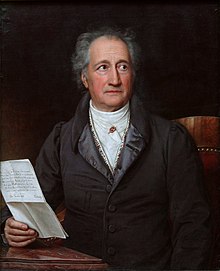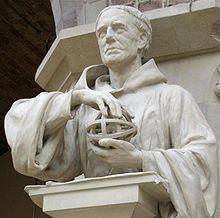
Natural philosophers
Natural philosophy or philosophy of nature (from Latin philosophia naturalis) is the philosophical study of physics, that is, nature and the physical universe. It was dominant before the development of modern science.
8 episodes
Episodes in this category also belong to the following categories:
Goethe
Melvyn Bragg discusses the great German polymath Johann Wolfgang Goethe - novelist, dramatist, poet, humanist, scientist and philosopher.
6 April 2006
Featuring: Tim Blanning, Sarah Colvin, W. Daniel Wilson
Philosophers of linguisticsGerman philosophers of artRomantic poetsGerman philosophers of scienceGerman political philosophersJohann Wolfgang von Goethe, Sturm und Drang18th-century German civil servants, 18th-century German dramatists and playwrights, 18th-century German historians, 18th-century German novelists, 18th-century German poets, 18th-century travel writers, 19th-century German civil servants, 19th-century German diplomats, 19th-century German dramatists and playwrights, 19th-century German poets, German bibliophiles, German diplomats, German male novelists, People from Weimar, Scientists from Weimar, Writers from Frankfurt, Writers from WeimarLiteracy and society theoristsPhilosophers of social science19th-century German philosophersTheorists on Western civilizationGerman travel writersPhilosophers of literaturePhilosophers of sexualityEpic poets19th-century German novelistsPhilosophy writersLeipzig University alumni18th-century German male writersEpigrammatists18th-century German philosophers, 18th-century essayists19th-century travel writers19th-century German male writersUniversity of Strasbourg alumniGerman philosophers of languageMembers of the Göttingen Academy of Sciences and HumanitiesLiterary theoristsMembers of the Bavarian Academy of SciencesFabulistsGerman untitled nobilityGerman philosophers of culture19th-century German essayistsGerman male essayists18th-century German educators, 18th-century historians, 19th-century German educators, 19th-century historiansGerman autobiographersGerman ethicists, German philosophers of educationNatural philosophersGerman male dramatists and playwrights, German male poetsPantheistsFreethought writersEnlightenment philosophersGerman librariansWriters about activism and social changeColor scientistsGerman Freemasons19th-century German historians19th-century German non-fiction writersGerman philosophers of historyGerman male non-fiction writersGoethe and the Science of the Enlightenment
Melvyn Bragg assesses the scientific legacy of the 18th century German poet and thinker Goethe, who gave us the term morphology and is sometimes even credited with inventing biology itself.
10 February 2000
Featuring: Nicholas Boyle, Simon Schaffer
SciencePhilosophers of linguisticsGerman philosophers of artRomantic poetsGerman philosophers of scienceGerman political philosophersJohann Wolfgang von Goethe, Sturm und Drang18th-century German civil servants, 18th-century German dramatists and playwrights, 18th-century German historians, 18th-century German novelists, 18th-century German poets, 18th-century travel writers, 19th-century German civil servants, 19th-century German diplomats, 19th-century German dramatists and playwrights, 19th-century German poets, German bibliophiles, German diplomats, German male novelists, People from Weimar, Scientists from Weimar, Writers from Frankfurt, Writers from WeimarLiteracy and society theoristsPhilosophers of social science19th-century German philosophersTheorists on Western civilizationGerman travel writersPhilosophers of literaturePhilosophers of sexualityEpic poets19th-century German novelistsPhilosophy writersLeipzig University alumni18th-century German male writersEpigrammatists18th-century German philosophers, 18th-century essayists19th-century travel writers19th-century German male writersUniversity of Strasbourg alumniGerman philosophers of languageMembers of the Göttingen Academy of Sciences and HumanitiesLiterary theoristsMembers of the Bavarian Academy of SciencesFabulistsGerman untitled nobilityGerman philosophers of culture19th-century German essayistsGerman male essayists18th-century German educators, 18th-century historians, 19th-century German educators, 19th-century historiansGerman autobiographersGerman ethicists, German philosophers of educationNatural philosophersGerman male dramatists and playwrights, German male poetsPantheistsFreethought writersEnlightenment philosophersGerman librariansWriters about activism and social changeColor scientistsGerman Freemasons19th-century German historians19th-century German non-fiction writersGerman philosophers of historyGerman male non-fiction writersHeraclitus
Melvyn Bragg and his guests discuss the ancient Greek thinker Heraclitus, immortalised by later scholars as the Weeping Philosopher.
8 December 2011
Featuring: Angie Hobbs, Peter Adamson, James Warren
PhilosophyAncient Greek political philosophersAncient Greeks from the Achaemenid EmpireNatural philosophersPhilosophers of religionAncient Greek epistemologists, Ancient Greek ethicistsAncient Greek metaphysiciansPhilosophers of timeAncient Greek philosophers of mind6th-century BC Greek philosophersOntologistsAncient Greek physicists5th-century BC Greek philosophersJohannes Kepler
Melvyn Bragg and guests discuss the German astronomer Johannes Kepler.
29 December 2016
Featuring: David Wootton, Ulinka Rublack, Adam Mosley
Kant's Copernican Revolution
Melvyn Bragg and guests discuss Kant's ideas on how the world depends on us, on the limits of human knowledge and why we are bound to ask questions we cannot answer.
3 June 2021
Featuring: Fiona Hughes, Anil Gomes, John Callanan
PhilosophyGerman philosophers of artNatural law ethicistsGerman philosophers of scienceGerman political philosophersMetaphilosophersPhilosophers of social sciencePhilosophers of warGerman Lutherans18th-century philosophersTheoretical historiansGerman nationalists19th-century German philosophersTheorists on Western civilizationPhilosophers of literatureGerman idealistsAge of EnlightenmentPhilosophers of logicLogiciansPhilosophers of lawPhilosophers of sexuality18th-century German writersPhilosophy writersRationalists18th-century German male writersKantianismGerman philosophers of mind, German philosophers of religionWriters about religion and science18th-century German philosophers, 18th-century essayists19th-century German male writers19th-century Prussian peopleHumor researchersGerman philosophers of culture19th-century German essayistsPeople of the Age of EnlightenmentGerman agnosticsGerman male essayistsOntologistsGerman ethicists, German philosophers of educationLecturersMembers of the Prussian Academy of SciencesIdealistsNatural philosophersEnlightenment philosophersGerman epistemologistsWriters about activism and social change19th-century German non-fiction writersGerman philosophers of historyGerman male non-fiction writersGerman logicians, Kantian philosophersPlato's Gorgias
Melvyn Bragg and guests discuss arguably the most personal of Plato's dialogues in which he examines the values that led to the execution of his mentor Socrates by drinking hemlock
25 November 2021
Featuring: Angie Hobbs, Frisbee Sheffield, Fiona Leigh
PhilosophyNatural law ethicistsPlatonismAncient Greek slaves and freedmenPhilosophers of deathTheorists on Western civilizationAncient Greek physicistsMoral realistsLogiciansAncient Greek epistemologists, Ancient Greek ethicistsRationalistsEpigrammatists of the Greek AnthologyPupils of SocratesPhilosophers of educationAncient Greek philosophers of mindOntologistsPhilosophers of loveClassical theismAttic Greek writersAncient Greek logiciansAncient Greek political philosophersIdealistsNatural philosophersAncient Greek metaphysiciansAncient Athenian philosophersRobert Hooke
Melvyn Bragg and guests discuss Robert Hooke, the 17th-century scientist with a wide variety of interests from elasticity to microscopes who fell out with Newton.
18 February 2016
Featuring: David Wootton, Patricia Fara, Rob Iliffe
Roger Bacon
Melvyn Bragg and guests discuss medieval English scholar Roger Bacon, an early pioneer of science who became known as Doctor Mirabilis.
20 April 2017
Featuring: Jack Cunningham, Amanda Power, Elly Truitt
HistoryMetaphysicians13th-century philosophersCatholic philosophersEnglish philosophersPhilosophers of languageEnglish translators, Medieval orientalistsNatural philosophersEnglish alchemistsGrammarians of LatinCatholic clergy scientists13th-century writers in LatinPhilosophers of scienceEmpiricistsPhilosophers of mindPhilosophers of literatureScholastic philosophers






